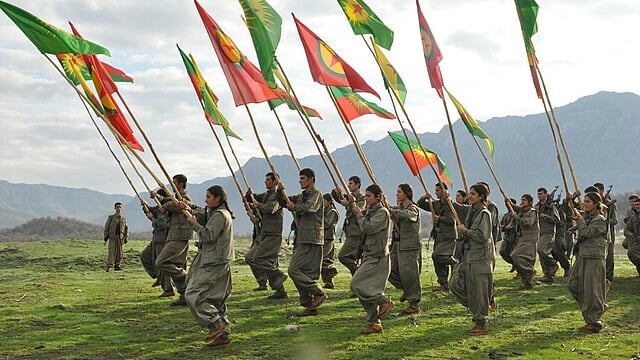The Kurdistan Workers’ Party (PKK) announced Monday, May 12, that it decided to disband and end its armed struggle with the Turkish state, which lasted over 40 years.
The announcement comes a couple of months after PKK’s jailed leader, Abdullah Öcalan, issued a statement from prison titled “Call for Peace and a Democratic Society,” in which he asked the group to lay down arms and dissolve itself.
According to The Firat News Agency (ANF), affiliated with the PKK, Öcalan took a “historic step” with his call, as he “placed change and transformation” at the forefront of the group’s agenda.
The PKK was founded by Abdullah Öcalan in Türkiye in 1978, with the mission of creating an independent state for the Kurdish population. The party’s objective shifted at a later stage to seeking autonomy and greater rights for the Kurds in Türkiye.
The Kurds, whose population is estimated to be between 30 and 45 million, have for centuries inhabited large parts of different countries in West Asia, including eastern Türkiye, northern Iraq, and western Iran, in addition to smaller parts of northern Syria and Armenia.
However, their aspirations for self-determination have been confronted with persecution by the governments of their countries, which pressured them to accept integration.
In 1984, the PKK began the armed struggle against the Turkish state, which continued for four decades and claimed 40,000 lives, according to media reports. The group, which was designated as a “terrorist organization” by Türkiye, the European Union (EU), and the US, operated in Türkiye and northern Iraq, with allies operating in areas inhabited by Kurds in Syria and Iran.
Abdullah Öcalan from armed struggle to reconciliation
Abdullah Öcalan fled to Syria in 1979, alongside a number of PKK members, in the wake of political unrest in Türkiye, one year after the party was founded.
During the 1980s and 1990s, then-Syrian president Hafez al-Assad allowed the PKK to establish bases and training camps in Syria and the Bekaa Valley in Lebanon, which was under Syria’s control at the time.
Due to geopolitical pressures, Hafez al-Assad asked Öcalan to leave Syria in 1998. One year later, the PKK leader was arrested by an operative of the Turkish security forces in Kenya.
Öcalan was initially sentenced to death on charges of “treason and separatism”, but the sentence changed to life in prison after Türkiye abolished capital punishment in 2004 in a bid to become a member of the EU.
Despite his imprisonment, Öcalan continued to wield considerable clout over his party, and he is still seen by the Kurds as a popular influential figure.
Regional factors that led to the dissolution decision
Analysts suggest that recent geopolitical developments contributed to PKK’s decision to disband and disarm. After former Syrian president Bashar al-Assad was overthrown in December 2024, Hay’at Tahrir al-Sham (HTS), which is backed by Türkiye, took over the country. This, in turn, made PKK more vulnerable to attacks by the Turkish forces and their allies in Syria.
The situation became harder for the party after the Kurdish-led Syrian Democratic Forces (SDF) signed an agreement with Syria’s HTS-led interim government to integrate into the state’s institutions.
SDF maintains that it is independent from the PKK despite being dominated by the Kurdish People’s Protection Units (YPG), which Türkiye views as a PKK offshoot.
The last few months also saw an advancement in the relations between Türkiye and Iraq, particularly in terms of security cooperation. In a meeting between Turkish President Recep Tayyip Erdoğan and Iraqi Prime Minister Mohammed Shia al-Sudani in Türkiye’s capital, Ankara, earlier in May, Al-Sudani reiterated “Iraq’s firm stance” against allowing its territory to be used in the conflict between Türkiye and PKK.
In October, 2024, the leader of Türkiye’s far-right Nationalist Movement Party (MHP), Devlet Bahçeli, suggested in a statement that Öcalan could be granted parole if “he renounces violence” and disbands the group.
MHP is perceived as an ally of Erdoğan, who is reportedly seeking support from Türkiye’s pro-Kurdish political party in parliament to enact a new constitution that could allow him to run for another presidential term.
Garnering such support has become more possible with PKK’s dissolution decision, which Erdoğan welcomed on Monday, calling it “an important decision for securing peace and fraternity” in Türkiye.




